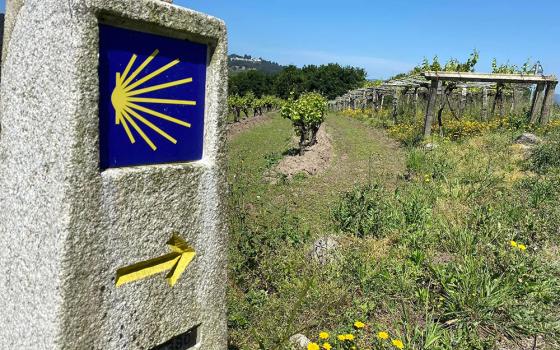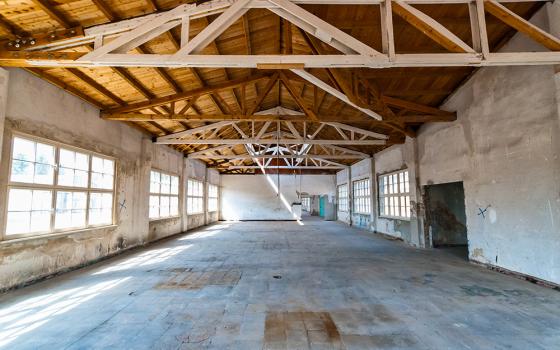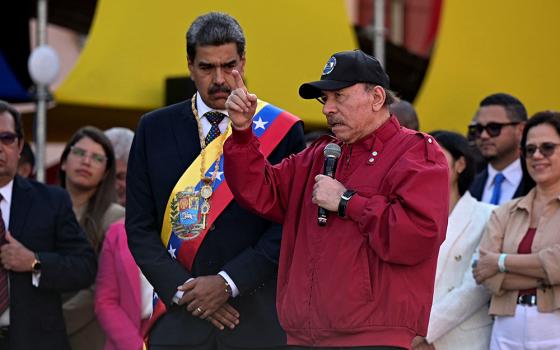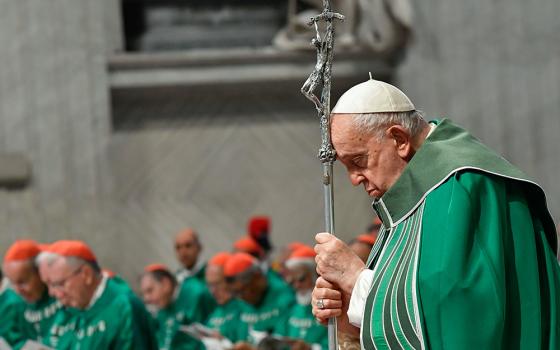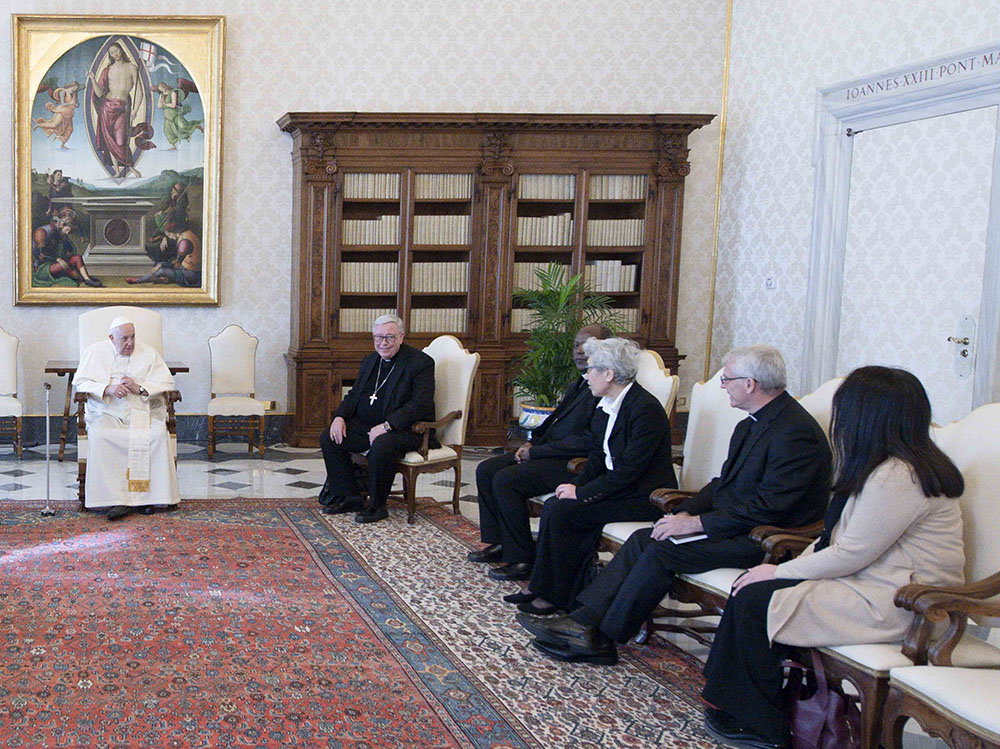
Pope Francis meets with Mercedarian Sr. Shizue "Filo" Hirota from Tokyo, third from right, and other members of the preparatory commission for the general assembly of the Synod of Bishops on March 16 in the library of the Apostolic Palace at the Vatican. Pictured to the right of the pope are: Cardinal Jean-Claude Hollerich of Luxembourg, general relator of the upcoming synod; Bishop Lucio Muandula of Xai-Xai, Mozambique; Hirota; Archbishop Timothy Costelloe of Perth, president of the Australian bishops' conference; and a synod staff member. (CNS/Vatican Media)
When Pope Francis met in March with members of a newly formed commission tasked with organizing the upcoming synod meetings in Rome, he seemed a bit surprised to see women when he entered the room.
Mercedarian Sr. Shizue "Filo" Hirota said Francis exclaimed, "Donne!" — Italian for "Women!" — upon seeing her and another official from the Vatican's synod office.
"He was happy, but he sounded like he hadn't expected to see us," Hirota told Global Sisters Report in an April 4 interview.
Hirota, who hails from Tokyo, is the only woman and only nonordained member of the seven-person committee, which was announced March 15. But despite being in the minority, she is unintimidated.
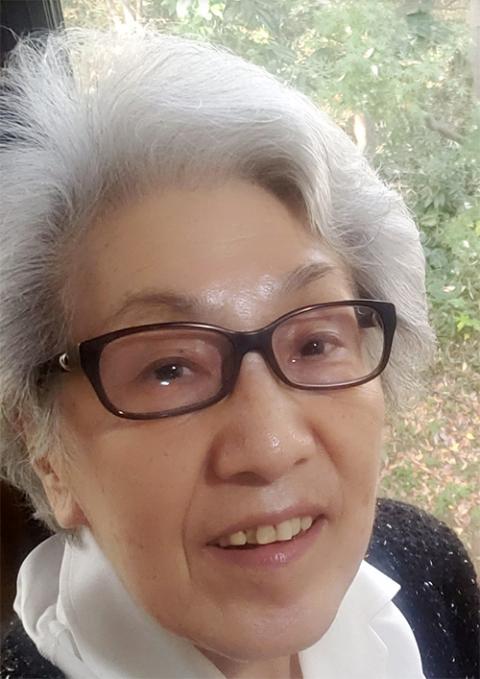
Mercedarian Sr. Shizue "Filo" Hirota (Courtesy of Filo Hirota)
"The pope has said it is not going to be just a Synod of Bishops, it's going to be a synod of the people of God," Hirota said. "But as a structure, the church is hierarchical, episcopal. I cannot represent all of the cries of the excluded, but perhaps I am there as a reminder."
For nearly two years, the Catholic Church has been engaged in a three-phase consultation process with Catholics around the globe that will culminate in two high-stakes meetings in October 2023 and October 2024 in Rome.
In the first phase, dioceses from around the world held listening sessions with Catholics and non-Catholics alike on a range of sensitive topics, culminating in a 45-page document that is a comprehensive and candid expression of the Catholic Church's relationship with the modern world.
The document formed the basis for meetings on every continent ahead of the upcoming Rome meetings, which Hirota is now tasked with helping to organize.
Hirota, however, is no stranger to managing and mobilizing large groups of Catholics from diverse backgrounds and opinions.
A former executive coordinator of the Mercedarian Missionaries of Berriz, board member of the International Union of Superiors General (UISG) and executive committee member of Pax Christi International, she has also served in the Philippines, Mexico and Nicaragua, giving her a front-row seat to how the church operates at both the peripheries and at its center.
Synodality, she said, is a "radically inclusive call not to leave anybody behind."
'Bishops who will be there have a big responsibility to be conscious of the fact that they are not there just as bishops, but they're representing millions of people.'
Specifically, as a member of the executive committee of Catholic Nonviolence Initiative, Hirota said she believes the synod "is a journey toward evangelical nonviolence."
"The world suffers from violence at all levels of human and environmental lives," she said. "The synod is participatory, collegial, grounded in and energized by the creative spirit of God, affirming the nonviolent impulse of listening dialogue and working through differences."
"From this perspective, the synod can be understood as a global, nonviolent practice to foster a more nonviolent church and world," she added.
Hirota said she was "very impressed" with the summary document, "Enlarge the space of your tent," which distilled the themes from the global listening sessions, including a greater emphasis on nonviolence and peacemaking.
The document raised concerns often considered taboo in church life — such as LGBTQ relationships and women's ordination — and Hirota recalled thinking, "Wow. Wow. It's really honest."
More specifically, she thought: "It really is the Holy Spirit at work."
Advertisement
In the coming months, the group will help oversee the drafting of the synod's working document, known as the instrumentum laboris, that will help guide the monthlong discussions in October. The committee will also be involved with other planning matters, like the retreat that will take place ahead of the synod, and even practical matters, like how the more than 300 participants will be seated during the synod. (There was hope that they might sit at round tables rather than in traditional stadium-style seating in the Vatican's synod hall.)
Hirota said she hopes that in both the planning process and during the actual October synod meetings, everyone involved will embrace what UISG identified in its triennial plenary in May 2022: the importance of vulnerability in the synodal process.
She said she also believes that the church must become more comfortable with "open-ended questions" and that being "able to live with questions unanswered and problems unsolved but still feeling peace" is an essential part of synodality, or walking together with the whole church.
In an interview with the Argentine daily La Nación last month, Francis promised that everyone participating in the synod — both men and women — will have the right to vote, marking a historic first.
Hirota recalled the Synod of Bishops on the family in 2015, where for the first time, a religious brother — a nonordained participant — was granted the right to vote. The appointment of Xavière Sr. Nathalie Becquart as undersecretary of the Vatican's synod office also led to headlines noting she would be the first woman granted the right to vote.
'Jesus Christ was human! Why is it a rare compliment in the Catholic Church for someone to be normal and human? We have to go back to that, recover our humanity.'
While Hirota is grateful for these developments, she also is amused that in 2022, such things manage to cause headlines.
"We are journeying to be normal," she said of the Catholic Church.
Hirota said it's not uncommon to hear someone praise a priest or a bishop by saying they are "normal" or "human."
"Jesus Christ was human! Why is it a rare compliment in the Catholic Church for someone to be normal and human? We have to go back to that, recover our humanity," she said.
Hirota told GSR that she is aware that the synod process has its naysayers, which she said is often rooted in a broader criticism of Francis. Even so, she said it is incumbent upon the synod organizers to listen to the detractors' concerns or fears.
"The only way to approach this is to be close to these people," she said.
She said her priority over the next six months as one of the synod's organizers is to ensure that the synod is, first and foremost, a "prayerful, contemplative, reflective and dialogical space."
And once the synod members arrive in Rome, she said, it will also be important for them to remember that they are not simply there to represent themselves.
"Bishops who will be there have a big responsibility to be conscious of the fact that they are not there just as bishops, but they're representing millions of people," Hirota said. "They have to keep this attitude of listening, respecting and remembering all of the time."
"This is about rethinking the structure, spirituality and our ways of being church," she continued. "It's about asking how the church of Jesus should be today."


